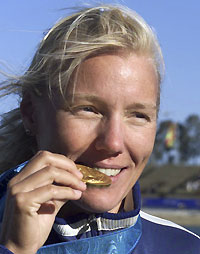ROME - Josefa Idem was a powerful, single-minded athlete in West Germany's flatwater kayak team of the 1980s.

Josefa Idem of Italy bites her gold medal during the awards ceremony for the women's K1 500m final at the Regatta Centre at the Sydney Olympics in this October 1, 2000 file photo. [Agencies] |
She was also a stranger to the top of the podium in international competition. Her natural talent and determination were taking her only so far.
An elusive quality was missing, one Idem found only when she left her homeland and started competing for Italy after falling in love with her future husband and coach, Guglielmo Guerrini.
"In Germany I was always a very serious athlete, very orientated towards my goals and I neglected my private life. But I didn't win," she told Reuters.
"Italy was undoubtedly the complement I lacked. You have to be determined, but at the same time you also have to know that life is beautiful, life should be lived.
"To come first you have to have a terrible need to win, as well as an awareness that you can survive without it, so you aren't afraid to lose."
Changing colours had an instant impact on Idem's career, spurring her to gold in the 500 metres singles at the 1990 world championships in Poznan in Poland, her first major competition for her new country.
The blend of German drive and Italian brio has proved an enduring recipe for success. Since Poznan, the 43-year-old has won four more world championship titles and three Olympic medals, including gold at Sydney in 2000.
In Beijing the mother of two will be paddling at her seventh Olympics since taking bronze for West Germany with Barbara Schuttpelz in the 500 metre doubles at Los Angeles in 1984.
Positive Attitude
Guerrini, a former volleyball coach who knew nothing about his wife's sport before taking over her training and who still today cannot kayak, is the unlikely architect of Idem's success.
"Guglielmo's lack of familiarity with the kayak was a positive factor that made us approach the sport in an unusual way," she said. "He did courses, we studied together.
"It was an obstacle that helped bring out the best in me."
Idem said that Guerrini's can-do approach when faced with a totally new challenge also inspired her to develop a positive attitude that has served her well.
"We learned our most important lessons from our biggest defeats. You should cherish your defeats," she said.
"For four years before the Sydney Olympics Canada's Caroline Brunet beat me every time. But I developed a way of thinking that made me a more consolidated person, by seeing second place not as a defeat but as a good starting point. I improved as a result and, at Sydney, Brunet was behind me."
In part, Idem has the end of the Cold War to thank for her switch of allegiance. Her initial intention after moving to Italy to be with Guerrini in 1988 was to continue competing for Germany.
But the fall of the Berlin Wall and the availability of athletes from East Germany meant the national team's coaches were unwilling to accommodate the needs of someone living outside the country.
"The German Canoeing Federation put a lot of pressure on me regarding attendance of training camps and various other things," she said. "Given that it was impossible to handle relations with the federation peacefully, I asked for permission (to switch nations), which came through in just a week.